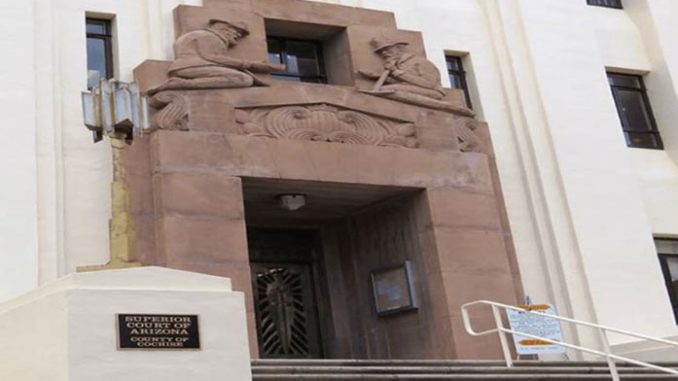
A judge has released minutes of a confidential, closed-door meeting of the Cochise County Board of Supervisors, and it shows one supervisor told the other two supervisors of his interest in accepting a prime appointment shortly after suggesting the board forgo an application process.
The comment by then-Supervisor Pat Call on Feb. 12, 2019 came during a non-public executive session shortly after he advocated at a public meeting to not accept applications from anyone interested in becoming justice of the peace for the Sierra Vista Justice Court. He was appointed to the position later that day with no public input.
Access to the executive session minutes is something attorneys for David Welch have tried to get since filing a lawsuit against Call and his fellow supervisors one week after the appointment was announced. The case has been delayed for nearly three years while Cochise County officials argued Welch, a Sierra Vista resident, did not have standing to challenge the appointment.
The Arizona Supreme Court backed Welch’s standing and ordered Judge Monica Stauffer of the Greenlee County Superior Court to move forward on Welch’s claims which includes an allegation that Call violated Arizona’s Conflict of Interest statute and that the board of supervisors violated Arizona’s Open Meeting Law.
The Supreme Court noted in its opinion that “the circumstances preceding Call’s appointment plausibly imply his involvement in his own nomination” and noted Call took part in the board’s decision on Feb. 12, 2019 to go into executive session “all without publicly disclosing his interest in the position” which paid double his supervisor salary.
Stauffer, who is hearing to case to avoid conflicts having a local judge on the case, recently ordered Cochise County officials to provide her the minutes of the executive session to determine if anything said was germane to the lawsuit. This was done as an in-camera, or for the judge’s eyes only, review.
“The Court having reviewed the Executive Session Proceeding Minutes in-camera, determines in her discretion, that the minutes are relevant and that justice so demands that the minutes be disclosed to the parties with this Order,” Stauffer wrote in her recent order, to which a copy of the minutes were attached.
The order and minutes were added to the public court file before the attorney for Cochise County had an opportunity to file a motion for reconsideration. Thus the public now knows the order of events leading up to Call’s appointment.
The Feb. 12, 2019 minutes also reveal two lawyers with the Cochise County Attorney’s Office attended the executive session. There is no mention of any requests from the supervisors for legal advice nor was any offered.
In fact, one of the attorneys asked Call during the executive session whether he was agreeing to accept the justice of the peace appointment.
“Vice-Chairman Call said that if he were appointed he would accept,” the Clerk of the Board then wrote in the minutes. The clerk also noted that at the beginning of the executive session, the same attorney, Britt Hansen, told the attendees “everything” that would be discussed is confidential.
The supervisors finished their executive session and then went into an unrelated meeting before reconvening the public meeting about the court vacancy at 12:31 p.m. Call was voted in as justice of the peace of the Sierra Vista Justice Court moments later and the meeting was adjourned at 12:36 p.m. with no public input.
Several local attorneys had attended the meeting to learn about the process the county board planned to use for filling the vacancy at the Sierra Vista Justice Court, one of the busiest justice courts in Arizona.
Nor was there any notice of Call’s interest in the high-paying judicial job, despite Arizona Revised Statute 38-503 which reads in part that any public officer with a “substantial interest in any decision of a public agency shall make known such interest in the official records of such public agency and shall refrain from participating in any manner as an officer…in such decision.”
According to the same statute, a person who intentionally or knowingly violates any provision of the Conflict of Interest statute is guilty of a Class 6 felony.
Welch’s lawsuit also argues myriad violations of Arizona’s Open Meeting Law, such as the fact the public was never provided advance notice that the board of supervisors would be voting at the Feb. 12 meeting to appoint a specific person to fill the vacancy.
Welch’s lawsuit was filed a week after Call’s appointment. Call’s term expired Dec. 31, 2020 and he did not seek election. A jury trial, potentially outside CochiseCounty, will likely not be held until late this year.
Welch is represented by attorneys Chris Russell and Jana Flagler, while the county board has retained a private attorney, James Jellison, as their legal counsel.
